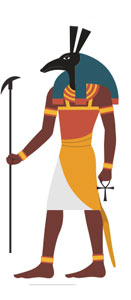Seth | God of Chaos
The Egyptian God Seth is also known as the god of chaos. According to popular Egyptian mythology it would certainly seem that he created plenty of mayhem. Scholars believe Seth's cult was one of the oldest in Egypt. Some pharaohs honored him and used his name as part of theirs during certain periods.
Who was the God Seth?
The Egyptians' concept of Seth changed over time. At first, the Egyptians saw Seth as a beneficial god. They believed he lived in the realm of the blessed dead. Seth was a god the Egyptians prayed to so he would help their dead family members.
After a time, the priests of Horus came into conflict with Seth’s adherents. Scholars believe Horus’ followers subjugated Seth’s. Then Seth’s role in the Pantheon changed. He became the polar opposite of Horus.
The Egyptians saw Seth as the god of darkness and chaos. He was also the lord of the desert. Seth became the god of the unclean and an opponent of several gods. Opposing priests destroyed most of Seth’s statuary.
He was the personification of drought. As lord of the desert and drought, Seth was an opponent of everything that gave life. The Egyptians also saw him as a storm and war god. The Egyptians associated Seth with the planet Mercury. The Egyptians associated the color red with Seth. They reviled people with red skin and, sometimes, killed animals with red fur.
What forms did the Egyptian god Seth take?
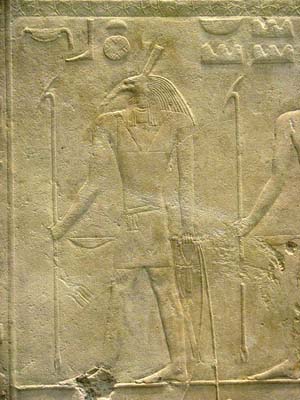
© Astra Nilsson - Relief of God Seth
The Egyptians usually depicted Seth as a man with the head of a fantastic animal that they called the Seth animal. It had a pointed snout, tall, rectangular ears and a thin canine body with a long forked tail. The Seth animal’s body had fur tufts in the shape of inverted arrows.
Seth’s images show him holding an ankh in one hand and a was staff in the other. The was staff was a long staff with a forked bottom and the head of the Seth animal on top.
The Egyptians also associated Seth with different animals and he was sometimes depicted as one of them. The animals include the boar, the antelope, the crocodile and the ass. Some Egyptians also associated him with poisonous creatures, like snakes and scorpions. In some myths, Seth took the form of a hippopotamus.
Family
- Father: Geb, the god of the earth
- Mother: Nut, the goddess of the sky
- Brother: Osiris, god of the underworld, vegetation and fertility
- Sister: Isis, goddess of magic, marriage and wisdom
- Sister/Consort: Nephthys, goddess of darkness and decay
- Brother: Haroeris (Horus the Elder), a sky god
- Nephew: Horus the Younger, sun god and patron god of the pharaoh
- Nephew/Son: Anubis, god of the dead and funerals
- Other Consorts: Anat and Astarte
The Egyptians saw Horus as possessing different identities but the line between them blurred. Thus, Horus was, in different forms, both the brother and nephew of Seth. Some legends named Seth as the father of Anubis but others named Osiris as Anubis’ father.
Seth helped Ra the sun god
In some myths, Seth opposed Ra and fought against him. This was not true in every myth. Some stories stated that Seth helped Ra. In these tales, he was a warrior on Ra’s sun boat who defended the boat against Apophis, the chaos serpent. Some stories said that Seth was put on the prow of the sun boat to fight Apophis.
Conflict with Horus
Seth’s conflicts with Horus can be divided between those with Haroeris and those with Horus the Younger. Seth’s fight with Haroeris was for the throne of the gods. Seth had usurped the throne which Haroeris argued was his. In one form of the myth, Haroeris and Seth went before the Divine Tribunal to argue their positions. Another form of this myth involved Horus the Younger (see below).
Isis used her wisdom to sway the Tribunal towards Haroeris. Seth got angry and insisted that the Tribunal ban Isis. The Tribunal kicked her out but she slipped back in disguise. Isis tricked Seth into admitting he was a usurper and the Tribunal began to favor Horus.
The meaning of the next part of the legend is unclear today.
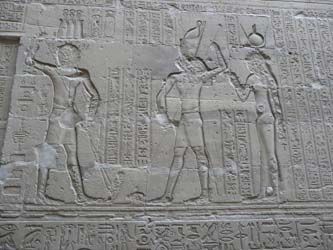
© Jodi Kurtz - Reliefs at Edfu, story of Seth and Horus
The Tribunal gave the throne to Haroeris. Seth’s fate differs depending on the myth. In some myths, the Tribunal game him to Isis as a prisoner. Other myths say Seth was put on the sun boat’s prow to battle Apophis and his forces.
Horus the Younger’s conflict with Seth hinges on the former’s role as an avenger. Seth wanted the throne of the gods, which belonged to his brother, Osiris. This was before the birth of Horus who, in this myth, was the son of Osiris and Isis. Seth murdered Osiris to gain his throne.
The method of this murder differs depending on the source of the story. Most Egyptian copies just say that Seth drowned Osiris. The Greco-Roman copies are much more elaborate. They begin with Seth building a sarcophagus that fitted Osiris exactly.
Then Seth tricked his brother into getting inside the sarcophagus. He then sealed the coffin and threw it into the Nile. Isis recovered Osiris’ body but Seth stopped her before she could restore her husband to life. Seth then cut up Osiris’ body and spread the pieces throughout Egypt.
Isis and Nephthys recovered all the pieces of Osiris’ body but one which a fish ate. Isis managed to bring Osiris back for one night during which she conceived Horus. She hid Horus from Seth while he was growing into adulthood. Seth tried to kill Horus while he was a boy but the attempts failed.
When Horus grew up, he fought Seth to avenge his father. The conflict lasted for decades. Finally, Seth turned into a hippopotamus and tried to destroy Horus’ boat. Horus speared Seth but the other gods stopped him from destroying his uncle. This was how Horus avenged Osiris' murder and gained the throne of the gods.
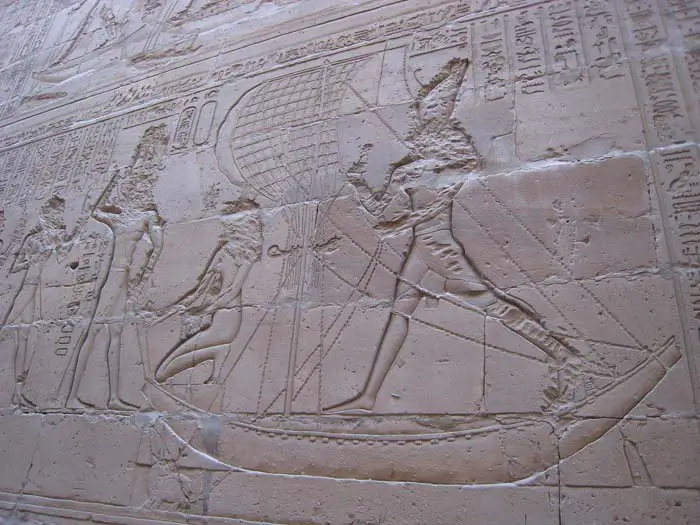
© Karen Green - Depiction of Horus defeating Seth
Worship of Seth
The pharaohs respected Seth and his power. Seth was one of the Two Lords (Horus was the other) who gave the king power and authority. Some pharaohs, like Seti I, were named for Seth. Other pharaohs used the Seth animal as part of their emblem.
Two major festivals were associated with Seth. One was one of the five Intercalary days, the days right before the New Year began. These were the days when the five Osirian gods (Osiris, Horus, Seth, Isis and Nephthys) were born. The Egyptians honored each of them on their birthday.
The other festival involved a ritual reenactment. Either the pharaoh or a priest would spear a model of a hippopotamus. Then the people cut up and ate a cake shaped like a hippopotamus. This festival reenacted Horus’ defeat of Seth.
Temples
One of the centers of Seth’s worship was Tukh or Ombos. Most of the temple is now a ruin but what remains dates to the New Kingdom period. One object found there was a huge was scepter that Amenhotep III dedicated to Seth. This is the largest faience object ever found in Egypt.
Avaris, the capital of the Hyksos, was another center of Seth’s worship. The Hyksos were a group of Asiatics who ruled Egypt during the Second Intermediate Period. They worshiped Seth because they associated him with their chief god, a storm god. During this time, two Hyksos goddesses, Anat and Astarte, were Seth’s consorts.
Seth as a Villain God
In many Egyptian myths, Seth was an adversary of different gods. But calling him a villain might be a misunderstanding. The Egyptians had a religion based on duality. All their gods had to have an opposite. Seth was the opposite of several other major gods.
Seth was Horus’ opposite. He was the darkness to Horus’ light and chaos to Horus’ order. Seth’s existence was necessary so Horus could also exist. In this matter, he was not seen as a villain by the Egyptians.
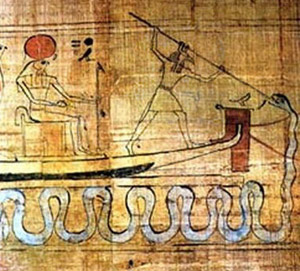
Depiction of Seth battling Apohis
Seth was also Osiris’ opposite. As lord of the desert and drought, Seth opposed his brother. Osiris was the lord of vegetation and fertility. Both gods were vital to maintaining order in Egypt.
At times, Seth was the opposite of the god Ra. Ra was a god of order and Seth was the god of chaos. Some myths have them battling nightly and Ra emerging victorious. Certain of these myths equated Seth with Apophis. Other stories say Seth fought for Ra against Apophis.
Artifacts of Seth
Most of the artifacts associated with Seth are images carved on temples. These images also relate the myths associate with Seth. Scholars found was scepters in some of Seth’s temples. These were dedicated to the god by the pharaoh or other worshipers.
The God Seth Facts
- Seth was the God of chaos, darkness, the desert and drought.
- The Egyptians had a religion of duality and Seth was the opposite of three other major gods; Osiris, Horus and Ra.
- Two of the centers of Seth’s worship were at Ombos and Avaris.
- Seth was one of the five Osirian gods.
- He murdered Osiris, whose son, Horus, later defeated him.
- The Egyptians associated the color red with Seth.
- Two of his main emblems were a mythical beast (the Seth animal) and the was scepter.

